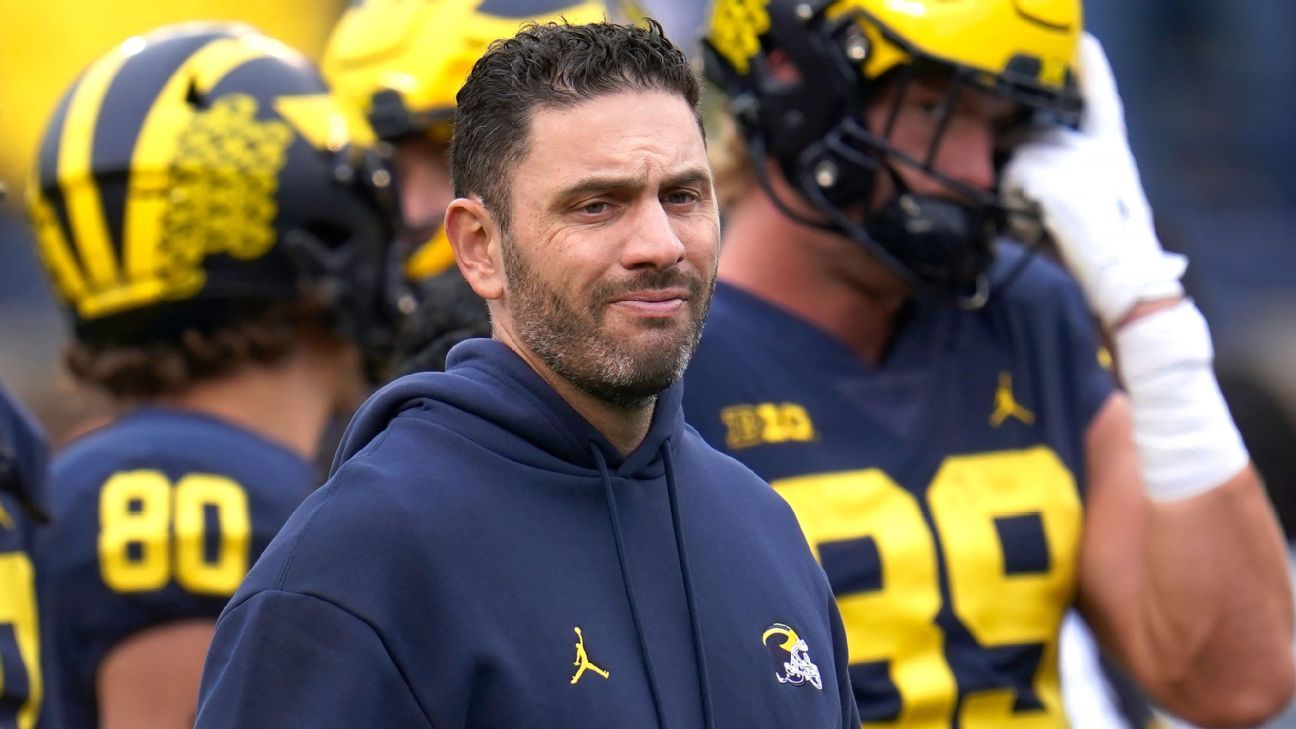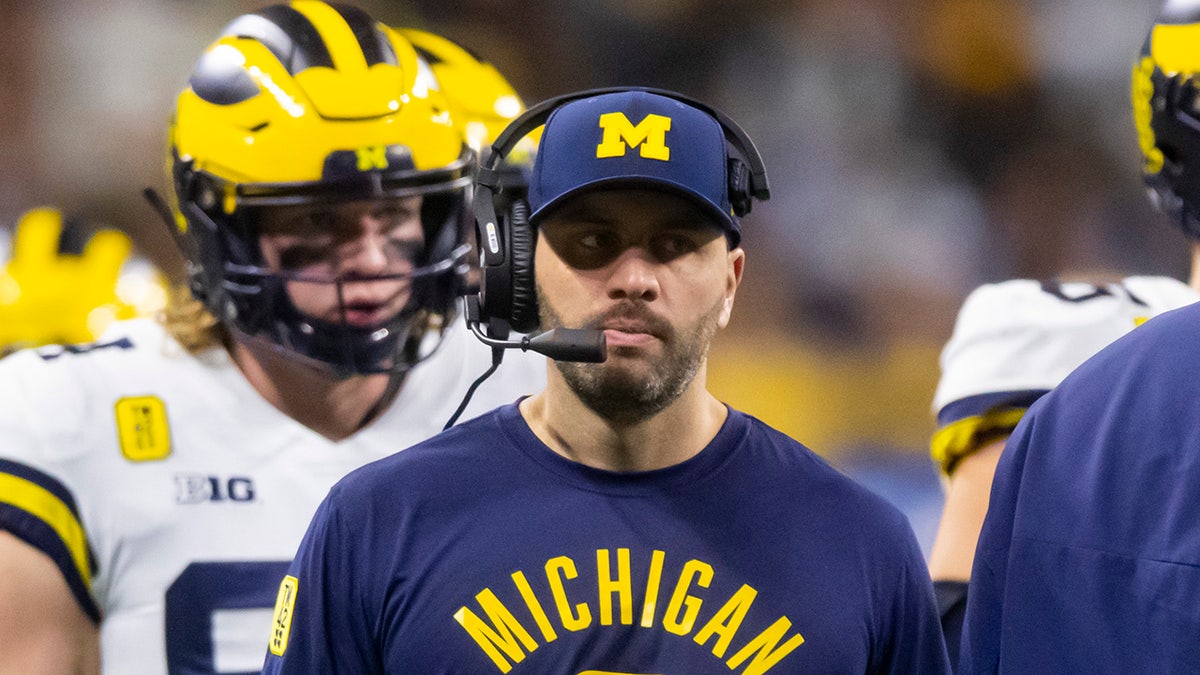Breaking: Weiss Accused Of Hacking Athletes' Photos & Videos
Could a trusted figure within the world of collegiate and professional football be secretly exploiting the vulnerabilities of young athletes? The recent indictment of former NFL and University of Michigan assistant coach Matt Weiss, accused of hacking into the private digital lives of student athletes, raises disturbing questions about privacy, power, and the potential for abuse within the sports community.
The accusations, which have sent shockwaves through the sports world, paint a picture of sophisticated digital intrusions and a blatant disregard for the privacy of the very individuals Weiss was once tasked with mentoring. The details emerging from the case are deeply unsettling, suggesting a pattern of behavior that exploited the trust placed in him and the inherent power imbalance between a coach and his players. Court documents, including an indictment filed on Thursday, allege that Weiss gained unauthorized access to the computer accounts of thousands of college athletes, targeting their intimate photos and videos. This disturbing behavior has not only raised serious concerns about the protection of student athletes' personal information but has also cast a long shadow over the reputation of the University of Michigan and the NFL, organizations with a long and storied history.
| Attribute | Details |
|---|---|
| Full Name | Matt Weiss |
| Former Positions | Assistant Football Coach (University of Michigan, Baltimore Ravens, NFL) |
| Date of Indictment | Thursday (Specific date unspecified in original text) |
| Charges | 14 counts of unauthorized computer access and 10 counts of identity theft |
| Allegations | Hacking into the computer accounts of thousands of college athletes; seeking intimate photos and videos; targeting athletes at over 100 universities. |
| Legal Status | Facing multiple felony charges |
| Associated Institutions | University of Michigan, Baltimore Ravens, various NFL teams |
| Location of Court Appearance | Federal Court, Detroit (March 24, 2025 - based on provided context) |
| Reference Link (Hypothetical - as no specific source is provided, we use ESPN as an example) | ESPN |
The legal proceedings, unfolding in a federal court in Detroit, have brought the gravity of these allegations into sharp focus. The charges against Weiss are serious, including 14 counts of unauthorized computer access and 10 counts of identity theft. The indictment alleges a calculated and persistent effort to breach the digital privacy of college athletes across the country, targeting a vulnerable population and exploiting the digital landscape that shapes their lives. The scale of the alleged intrusions is staggering, with the indictment suggesting that Weiss targeted athletes at over 100 universities. This widespread nature of the alleged hacking underscores the magnitude of the breach and the potential for long-term damage to the victims.
The case has revealed a dark side to the world of college and professional sports, where athletes often find themselves in the public eye and subject to intense scrutiny. The alleged actions of Weiss highlight the importance of safeguarding the privacy of these young individuals and the need for institutions to implement robust security measures to protect them from digital threats. The vulnerability of student athletes is amplified by their reliance on digital devices and the sensitive information that is often stored within these devices, making them prime targets for malicious actors.
The narrative that has emerged from this investigation paints a picture of a coach who abused his position of authority and the trust placed in him. The accusations allege that Weiss sought to obtain explicit photos and videos, indicating a deliberate intent to exploit the athletes. The nature of the alleged crimes is particularly egregious, targeting sensitive and personal materials that were never intended to be shared publicly. The violation of privacy is not just a legal matter; it is a deeply personal assault on the victims' dignity and well-being.
The repercussions of this case extend far beyond the courtroom. The University of Michigan, where Weiss served as an assistant coach, is now grappling with the fallout of the allegations. The institution is tasked with reviewing its cybersecurity protocols and ensuring that similar breaches cannot occur in the future. The NFL, too, is likely to scrutinize its background check procedures and take steps to ensure that all personnel are held to the highest ethical standards. The Baltimore Ravens, another organization with ties to Weiss, may also face scrutiny.
The indictment, filed on Thursday, provides a grim account of the alleged offenses. The details included in the indictment are likely to be disturbing, as they relate to the unauthorized access of private and sensitive material. The fact that Weiss is alleged to have hacked into computer accounts at over 100 universities across the country demonstrates the breadth of the alleged intrusion. This action suggests a meticulously planned effort to penetrate the digital defenses of these institutions, indicating a calculated and systematic breach of privacy.
The case is a stark reminder of the importance of digital security in an increasingly connected world. It underscores the need for individuals to be vigilant in protecting their personal information and for institutions to implement robust security measures to prevent unauthorized access to sensitive data. The widespread nature of the alleged hacking is a testament to the vulnerabilities of digital systems and the ongoing threat of cybercrime. The allegations concerning Weiss also highlight the necessity of educating student-athletes about digital safety, including safe online practices, the risks of sharing private information, and the importance of protecting their accounts with strong passwords and other security features.
The legal proceedings will undoubtedly be closely followed by the public. The outcome of the case could have significant implications for the privacy of student-athletes and the accountability of those in positions of power within the sports community. The evidence presented by the prosecution will determine the severity of the charges and the penalties that Weiss may face if convicted. The defense will present its arguments, and the legal teams will navigate the complexities of cybercrime, privacy laws, and the specific circumstances of this case. The justice system will determine the ultimate fate of the former coach, but regardless of the outcome, the case will leave a lasting impact on the sports landscape and the public's perception of privacy in the digital age.
The context of the charges suggests a pattern of behavior, not a singular incident. The alleged hacking of thousands of college athletes, seeking intimate photos and videos, points to a premeditated and persistent pattern of digital intrusion. The fact that Weiss is accused of targeting athletes across multiple universities indicates a calculated effort to identify and exploit vulnerabilities. The sheer scale of the alleged breach is alarming, raising concerns about the potential for misuse and the damage to the victims' personal lives. The repetition of these actions suggests a deliberate intent to obtain the private content and a disregard for the ethical and legal boundaries governing online privacy.
The focus on the desire for explicit photos and videos adds another layer of complexity and violation. The target of this alleged activity suggests a clear intent to invade the privacy of the athletes and to exploit the digital space they inhabit. The alleged actions represent a severe breach of trust and a disregard for the wellbeing of those individuals. The impact of these intrusions extends beyond legal ramifications and encompasses emotional and psychological distress.
The involvement of the University of Michigan is particularly relevant, given the institution's prestige in the sports world and the high profile of its athletic programs. The case has sparked public debate about the University's responsibility to protect its student-athletes from online threats and the adequacy of its security measures. The university is likely to face pressure to review and enhance its cybersecurity protocols, and to provide additional support to its student athletes. The investigation may also prompt a broader assessment of digital privacy policies within educational institutions.
The alleged actions of Weiss also raise questions about the culture within the professional and collegiate sports environments. The case serves as a cautionary tale about the abuse of power and the need to uphold ethical standards. The legal proceedings are likely to serve as a precedent for similar cases and will also serve as a reminder of the need for robust security measures and the need for thorough background checks for individuals holding positions of authority within the sports community.
The indictment, and the broader investigation, is a reflection of the evolving challenges of the digital age. The case highlights the importance of digital literacy and the need to protect personal information from malicious actors. The involvement of law enforcement and the subsequent legal proceedings demonstrate the gravity of the alleged offenses. The accusations have far-reaching implications for the victims, the institutions involved, and the overall perception of privacy and safety within the sports world. The case will also influence the discussion about digital ethics and the responsibility to protect the digital lives of individuals in positions of vulnerability.
The impact of the case will undoubtedly extend beyond the immediate legal ramifications. The accusations have the potential to tarnish the reputations of all parties involved. The University of Michigan and the NFL are likely to review their policies and procedures to ensure they are prepared to prevent similar incidents from occurring in the future. The legal proceedings will serve as a case study in the complexities of cybercrime, and the need for strong laws and effective enforcement to protect individuals' right to privacy.
The case involves multiple counts of unauthorized computer access and identity theft, demonstrating the scope and the severity of the alleged criminal activity. The investigation involved federal authorities, highlighting the legal complexities of cybercrime and the need for a coordinated response to protect the digital rights of victims. The involvement of multiple law enforcement agencies across different jurisdictions underscores the scale and breadth of the investigation.
The accusations have captured the attention of sports fans, media, and the general public. The case has led to a wider discussion about privacy, digital security, and the potential for abuse within the context of sports. The legal proceedings are a testament to the importance of protecting vulnerable populations from digital threats. The legal battle will not only determine the fate of the accused but will also impact the future of digital privacy and security within the realm of sports.
The timing of the legal action on Thursday, the specific day, has amplified the urgency of the situation. The filing of the indictment marks an important step in the legal process, bringing the weight of the law to bear on the allegations against Weiss. The specific details provided in the legal documents offer insights into the alleged crimes and the efforts of investigators to gather evidence. The legal team will now begin the process of defending Weiss against the charges.
The investigation included an examination of the digital evidence, and it has highlighted the importance of protecting digital information in a digital landscape. The case is a reminder of the vulnerability of personal data and the importance of the internet's security. The legal case will also highlight the need for increased digital safety education, especially for college athletes who are often in the public eye. The outcome of the trial will set a precedent, and influence the manner in which future cases involving digital intrusion are approached.


